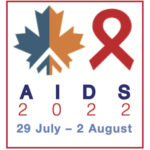Montreal’s response to monkeypox: rapid vaccine rollout, 39 breakthrough infections
1 September 2022. Related: Conference reports, mpox, World AIDS 24 Montreal 2022.
Simon Collins, HIV i-Base
 The main session at AIDS 2022 on monkeypox also included a presentation by Geneiviève Bergeron on the rapid public health response to monkeypox (MPX) in Montreal including launching the first prophylaxis vaccine programme.
The main session at AIDS 2022 on monkeypox also included a presentation by Geneiviève Bergeron on the rapid public health response to monkeypox (MPX) in Montreal including launching the first prophylaxis vaccine programme.
On 12 May 2022, five cases of unusual cancroid had been seen at one of the sexual health clinics in the city, and after the announcement of UK cases on 16 May, the connection to MPX was confirmed in Montreal. The city initiated an emergency response on 19 May that included involving community organisations.
This led to a rapid and sustained community response that included sharing medical and scientific information, promoting the vaccine and supporting self-isolation.
Early on this included recognising that contact tracing would not contain an outbreak as more than 80% of contacts were not traceable because their details were not available.
Canada was also lucky in having stockpiled vaccines as part of the national strategic reserve and this was part of a strategy to quickly limit further infections.
From 3 June 2022, Montreal offered free vaccination in open-access clinics to anyone at recent risk of MPX, including at sexual health and mobile clinics. This was expanded from 14 June to include pre-exposure prophylaxis for all gay men at risk. Single doses were given to as many people as possible but a second shot will be availble for people living with HIV. By 31 July, more than 15,000 people had received the vaccine.
This limited the number of cases to 317 (confirmed or probable) by 1 August, all men except 4 women (3 trans, 1 cis). Nearly all cases involved likely sexual contact and only one household transmission. Most were managed at home, although seven cases were hospitalised (none fatal) and five cases were in people who were homeless.
The first data were also presented on 39 cases of MPX in people who had recieved the vaccine, including 20/39 where this had occured more than two weeks after the shot. However, timing of exposure is unknown, as is the denominator of people that were at risk post-vaccine.
Reference
Bergeron G. Public health management and vaccines. AIDS 2022 (Montreal). 29th July to 2nd August.
https://programme.aids2022.org/Programme/Session/860

